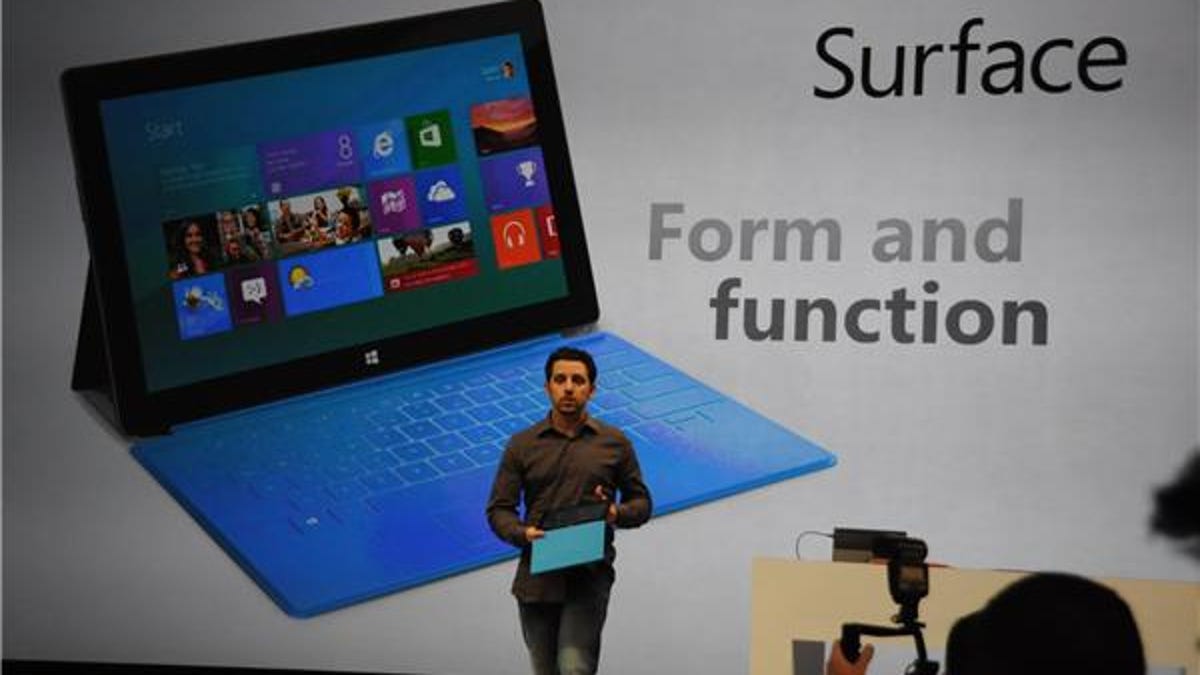Who is the Microsoft Surface for, exactly?
The new Windows 8 and Windows RT tablets could be a bridge for Windows fans... maybe.

Microsoft threw a surprise hail mary in Los Angeles today with the unveiling of its new line of Windows 8 and Windows RT tablet-laptop hybrids dubbed simply "Surface." But some big questions remain, like -- when? how much? and who is this for?
Surface is a bit larger than an iPad with an HD display, full-size USB port, Microsoft's next-generation operating system, a built-in kickstand, and a detachable cover that doubles as a flat keyboard and touch pad. That's what we know from today's unveiling, but there's much more that we don't know.
The biggest question mark -- the price.
The company says Surface will be competitive with comparable ARM tablets for the RT device and the Windows 8 Pro version will hold its own against ultrabooks with similar specs. OK, so that's maybe $500 for the lower-end tablet that comes with an RT version of Office Home and Student 2013. Sounds like a nice deal, until you realize that this extra is likely to ease the pain of the fact that your existing Windows applications aren't likely to run on the ARM tablet. That brings us to another of those questions -- who is this thing really for?
Staying with the RT tablet, it seems it's for anyone who's been waiting very patiently to pay iPad prices for the Windows environment on a tablet, even if that Windows environment is about as familiar to most users as the roster of names on Greenland's soccer team. But you do get a pretty cool keyboard as part of the deal -- maybe. It wasn't completely clear if the keyboard cover would be an added accessory or included in the price of the tablet.
Knowing what little we do right now, it seems that low-end tablet might be a hard sell to anyone but the Windows faithful, and we all know how that approach worked out for RIM and its PlayBook.
The Windows 8 Pro Version could be a little more interesting, even with a higher price tag, provided that it does really deliver the same level of performance as an ultrabook and top flight iPad rolled into one. An awful lot of people in the world still live their lives in Windows (a disturbing number of us in XP), and it continues to be awkward to live a double life of sorts between assuming our Windows persona in the office and then having to change into our iOS / Android outfit every time we go out or hang around on the couch with a mobile device. Surface could be the bridge between at-the-desk computing and being connected everywhere else.
There's an awful lot of outreach to developers that's going to need to be done to the lay the foundation for that bridge in the meantime.
Not long after the iPhone came out, I opted instead to purchase a Windows Mobile phone in the hopes that it might be that bridge. Oh, how wrong I was. Even today, Windows Phone struggles to bring a little bit of Windows to the mobile experience while also trying to compete with Android and iOS. In fact, it's not doing terribly well at either.
Windows 8 could truly be a revolutionary operating system, but if only Microsoft is participating in the revolution and the universe of developers creating for Android and iOS stay on the sidelines, Surface could end up hanging out with Microsoft Bob in the annals of great Redmond flops.
Microsoft CEO Steve Ballmer told the Verge after the unveiling that the idea behind Surface is to "prime the pump" for Windows 8 and get more of those developers and partners on board.
But Redmond didn't even seem to get the memo about Surface to all of its own departments.
So far there's been no word of how Surface might integrate with other hit Microsoft products like Xbox or the recently announced Smart Glassconcept, which would seem like a natural feature to integrate into a new tablet, or any new piece of hardware, for that matter.
Of course, there's still another Microsoft event coming up quick, this one having to do with Windows Phone, so we may be hearing more about how Surface plays into Microsoft's plans in the coming days.
But for right now, with no word on pricing, availability or any other way to actually get your hands on one, I can say confidently that in the near-term Microsoft Surface is for...nobody.

